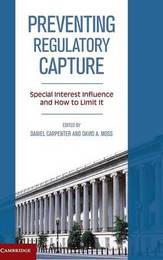
|
Preventing Regulatory Capture: Special Interest Influence and How to Limit it
Hardback
Main Details
| Title |
Preventing Regulatory Capture: Special Interest Influence and How to Limit it
|
| Authors and Contributors |
Edited by Daniel Carpenter
|
|
Edited by David A. Moss
|
| Physical Properties |
| Format:Hardback | | Pages:530 | | Dimensions(mm): Height 231,Width 150 |
|
| ISBN/Barcode |
9781107036086
|
| Classifications | Dewey:352.8 |
|---|
| Audience | | Professional & Vocational | |
|---|
| Illustrations |
23 Tables, unspecified; 18 Line drawings, unspecified
|
|
Publishing Details |
| Publisher |
Cambridge University Press
|
| Imprint |
Cambridge University Press
|
| Publication Date |
21 October 2013 |
| Publication Country |
United Kingdom
|
Description
When regulations (or lack thereof) seem to detract from the common good, critics often point to regulatory capture as a culprit. In some academic and policy circles it seems to have assumed the status of an immutable law. Yet for all the ink spilled describing and decrying capture, the concept remains difficult to nail down in practice. Is capture truly as powerful and unpreventable as the informed consensus seems to suggest? This edited volume brings together seventeen scholars from across the social sciences to address this question. Their work shows that capture is often misdiagnosed and may in fact be preventable and manageable. Focusing on the goal of prevention, the volume advances a more rigorous and empirical standard for diagnosing and measuring capture, paving the way for new lines of academic inquiry and more precise and nuanced reform.
Author Biography
Daniel Carpenter is the Allie S. Freed Professor of Government and Director of the Center for American Political Studies in the Faculty of Arts and Sciences at Harvard University. His first book, The Forging of Bureaucratic Autonomy: Reputations, Networks and Policy Innovation in Executive Agencies, 1862-1928, was awarded the APSA's Gladys Kammerer Prize, as well as the Charles Levine Prize of the International Political Science Association. His second book, Reputation and Power: Organizational Image and Pharmaceutical Regulation at the FDA, received the 2011 Allan Sharlin Memorial Award from the Social Science History Association. Professor Carpenter has held fellowships from the John Simon Guggenheim Foundation, the Radcliffe Institute for Advanced Study, the Center for Advanced Study in the Behavioral Sciences, the Brookings Institution and the Santa Fe Institute. He has received grants from the National Science Foundation, the National Endowment for the Humanities, the Robert Wood Johnson Foundation (Scholars in Health Policy 1998-2000, Investigator Award in Health Policy Research 2004-7), the Alfred Sloan Foundation, the Russell Sage Foundation and the Safra Center for Ethics. David Moss is the John G. McLean Professor at Harvard Business School and the President of the Tobin Project, the nonprofit research organization which sponsored this volume. He has published numerous books and articles on economic policy and policy history, including When All Else Fails: Government as the Ultimate Risk Manager, which won the American Risk and Insurance Association's Annual Kulp-Wright Book Award for the 'most influential text published on the economics of risk management and insurance'. Other books include Socializing Security: Progressive-Era Economists and the Origins of American Social Policy, A Concise Guide to Macroeconomics, and Government and Markets: Toward a New Theory of Regulation (Cambridge University Press, 2010, co-edited with Edward Balleisen). Professor Moss is the recipient of numerous honors and awards, including the Robert F. Greenhill Award, the Editors' Prize from the American Bankruptcy Law Journal, and the Student Association Faculty Award for outstanding teaching at Harvard Business School.
Reviews"This collection deftly sharpens our thinking about the nature of regulatory capture. It compiles the most multidimensional treatment we have of capture and the American regulatory state." - John Braithwaite, Australian National University "This is an enormously useful collection that goes beyond alleging and lamenting regulatory capture to provide diagnostic tools for evaluating purported instances of captured regulatory regimes and institutional techniques for avoiding their emergence and mitigating their effects." - Jerry Mashaw, Yale University "'Regulatory capture' is an often used, little understood term. It is quoted frequently by those who would like to question a regulation for any of a number of agendas without an effort to understand the science or reason behind it. Daniel Carpenter, David Moss, and the co-authors have written a long overdue analysis of the issue and what, when proven true, can be done about it. - Christine Todd Whitman, former governor of New Jersey and former administrator of the Environmental Protection Agency
|